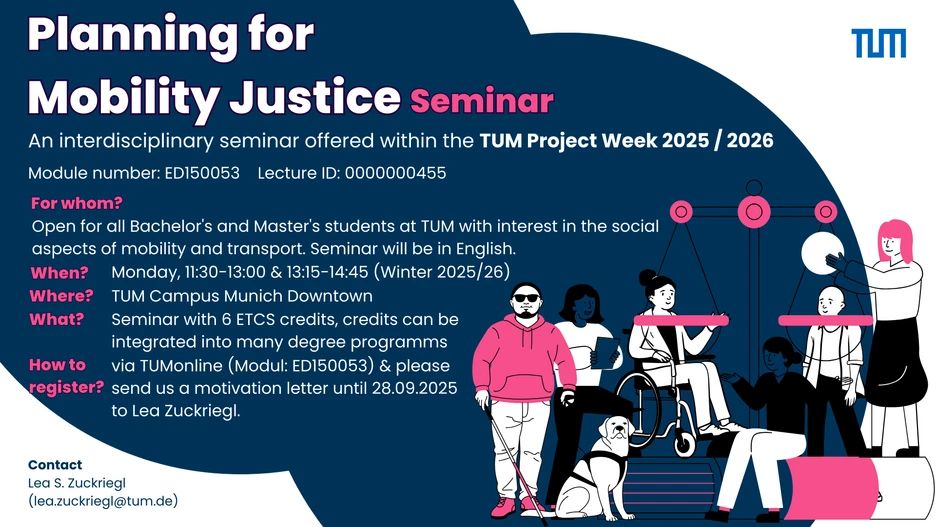Planning for Mobility Justice
| Vortragende/r (Mitwirkende/r) | |
|---|---|
| Nummer | 0000000455 |
| Art | Seminar |
| Umfang | 4 SWS |
| Semester | Wintersemester 2025/26 |
| Unterrichtssprache | Englisch |
| Stellung in Studienplänen | Siehe TUMonline |
| Termine | Siehe TUMonline |
- 13.10.2025 11:30-13:00 2350, Veranstaltung
- 13.10.2025 13:15-14:45 2350, Veranstaltung
- 20.10.2025 11:30-13:00 2350, Veranstaltung
- 20.10.2025 13:15-14:45 2350, Veranstaltung
- 27.10.2025 11:30-13:00 2350, Veranstaltung
- 27.10.2025 13:15-14:45 2350, Veranstaltung
- 03.11.2025 11:30-13:00 2350, Veranstaltung
- 03.11.2025 13:15-14:45 2350, Veranstaltung
- 10.11.2025 11:30-13:00 2350, Veranstaltung
- 10.11.2025 13:15-14:45 2350, Veranstaltung
- 17.11.2025 11:30-13:00 2350, Veranstaltung
- 17.11.2025 13:15-14:45 2350, Veranstaltung
- 24.11.2025 11:30-13:00 2350, Veranstaltung
- 24.11.2025 13:15-14:45 2350, Veranstaltung
- 01.12.2025 11:30-13:00 2350, Veranstaltung
- 01.12.2025 13:15-14:45 2350, Veranstaltung
- 08.12.2025 11:30-13:00 2350, Veranstaltung
- 08.12.2025 13:15-14:45 2350, Veranstaltung
- 15.12.2025 11:30-13:00 2350, Veranstaltung
- 15.12.2025 13:15-14:45 2350, Veranstaltung
- 22.12.2025 11:30-13:00 2350, Veranstaltung
- 22.12.2025 13:15-14:45 2350, Veranstaltung
- 12.01.2026 11:30-13:00 2350, Veranstaltung
- 12.01.2026 13:15-14:45 2350, Veranstaltung
- 19.01.2026 11:30-13:00 2350, Veranstaltung
- 19.01.2026 13:15-14:45 2350, Veranstaltung
- 26.01.2026 11:30-13:00 2350, Veranstaltung
- 26.01.2026 13:15-14:45 2350, Veranstaltung
- 02.02.2026 11:30-13:00 2350, Veranstaltung
- 02.02.2026 13:15-14:45 2350, Veranstaltung
- 09.02.2026 14:00-20:00 0136, Immatrikulationshalle , Abschlussveranstaltung für Vorlesung: Planning for Mobility Justice
Teilnahmekriterien
Anmerkung: Das Seminar ist im Wintersemester 2025/2026 für alle Studierenden der TUM geöffnet, unabhängig des Studiengangs. Anmeldung läuft ab dem 26.09.2025. Wir bitten zusätzlich um die Zusendung eines kurzen Motivationsschreibens an Lea Zuckriegl (lea.zucrkiegl@tum.de) bis zum 08.10.2025. Ein Fixplatz wird am Dienstag, 14.10.2025, vergeben, nach der ersten Lehrveranstaltung am Montag, 13.10.2025. Erscheinen zum ersten Termin ist auf jeden Fall notwendig, um einen Fixplatz zu erhalten!
Lernziele
- Fälle von Ungerechtigkeit innerhalb der aktuellen Mobilitätssysteme kritisch zu identifizieren
- die Unterschiede von Mobilitätsungerechtigkeiten für verschiedene Gruppen zu verstehen und zu untersuchen
- relevantes Wissen in der entsprechenden Literatur nachzuschlagen
- und dieses Wissen anzuwenden, um Lösungen zu entwickeln, die Mobilitätsgerechtigkeit fördern.
Beschreibung
Inhaltliche Voraussetzungen
Englisch Kenntnisse erforderlich (mind. B1).
Lehr- und Lernmethoden
- Projektbasiertes Lernen und Lehren
- Gruppenarbeit
- Austausch mit externen Partnern
Studien-, Prüfungsleistung
Empfohlene Literatur
- Martens, K. (2016). Transport justice: Designing fair transportation systems. Routledge.
- Lucas, K. (2012). Transport and social exclusion: Where are we now?. Transport policy, 20, 105-113.
Links

Description
This seminar introduces students to the concept of Mobility Justice and empowers them to critically examine and challenge inequalities in how people experience urban space. Following a three-part structure — Awareness, Assessment, and Addressing — students will explore why mobility justice matters by engaging with theory, practice, and the lived experiences of those affected. The students will analyze real-world case studies using a mixed-methods approach. Students work together in groups to co-create creative social interventions (such as podcasts, comics, architectural models, or board games) that raise public awareness and spark change. Blending academic inquiry with hands-on practice, this course fosters critical thinking, empathy, and action toward more inclusive and just mobility systems.
Details
| TUMonline | Modul-Nr. ED150053 Lecture ID 0000000455 |
| When? | Throughout the entire winter semester 2025/2026, every Monday, 11:30 a.m. to 1:00 p.m. & 1:15 p.m. to 2:45 p.m. |
| Where? | Room 2350 at the TUM Campus Munich Downtown |
| For whom? | Bachelor's and Master's students from all disciplines and schools with an interest in the social component of mobility |
| Credits? | 6 ECTS credits are transferable as free electives in most subjects. If not, we will gladly issue a detailed certificate of participation. |
| Registration | Via TUMonline. In addition, please send us a letter of motivation by email by 28 September 2025. |
| Contact | Lea S. Zuckriegl (lea.zuckriegl@tum.de) |
The first round of the seminar in winter term 2025/2026 is part of the TUM Project Week program. From the winter term 2026/2027, the seminar will be offered as a regular course in the study programs transportation systems, environmental engineering, and civil engineering. But, it is planned to have an open access for other diciplines to maintain a diversity of perspectives.
Interested?
Make a note of the seminar in TUMonline. It will be visible in the course catalog in September 2025. From then on, registration in TUMonline will be possible. In addition, we would like to hear your motivation why you want to joint the seminar. Therefore, please send a motivation text to Lea Zuckriegl (lea.zuckriegl@tum.de) by September 28, 2025.
Link to the module in TUMonline:
https://campus.tum.de/tumonline/WBMODHB.wbShowMHBReadOnly?pKnotenNr=4526609&pOrgNr=15094
Room for Improvement
The seminar is part of Lea Zuckriegl's PhD. Throughout the semester, students are asked to complete small tasks to track their learning process and provide honest feedback in surveys or similar. The activities are integrated into the courses so that there is no additional workload for students. The results are used to adapt and/or improve the seminar for future students.
Contact
Lea S. Zuckriegl (lea.zuckriegl(at)tum.de)
Additional Information
The conceptualization, implementation, and evaluation of the seminar is part of an individual PhD process. Participating students may therefore be asked to take part in additional feedback exercises and sessions. This lays the foundation for continuously improving the seminar for future students in the long term and provides details on how mobility justice can be effectively taught in higher education.
For more details, please contact Lea S. Zuckriegl (lea.zuckriegl@tum.de). Thank you.